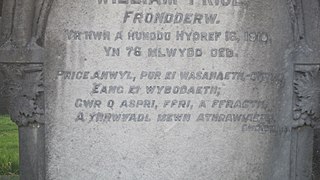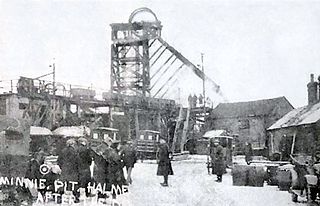Related Research Articles
Dactylic hexameter is a form of meter or rhythmic scheme frequently used in Ancient Greek and Latin poetry. The scheme of the hexameter is usually as follows :
In poetry, metre or meter is the basic rhythmic structure of a verse or lines in verse. Many traditional verse forms prescribe a specific verse metre, or a certain set of metres alternating in a particular order. The study and the actual use of metres and forms of versification are both known as prosody.
A rhyme is a repetition of similar sounds in the final stressed syllables and any following syllables of two or more words. Most often, this kind of rhyming is consciously used for a musical or aesthetic effect in the final position of lines within poems or songs. More broadly, a rhyme may also variously refer to other types of similar sounds near the ends of two or more words. Furthermore, the word rhyme has come to be sometimes used as a shorthand term for any brief poem, such as a nursery rhyme or Balliol rhyme.

Wilfred Edward Salter Owen MC was an English poet and soldier. He was one of the leading poets of the First World War. His war poetry on the horrors of trenches and gas warfare was much influenced by his mentor Siegfried Sassoon and stood in contrast to the public perception of war at the time and to the confidently patriotic verse written by earlier war poets such as Rupert Brooke. Among his best-known works – most of which were published posthumously – are "Dulce et Decorum est", "Insensibility", "Anthem for Doomed Youth", "Futility", "Spring Offensive" and "Strange Meeting". Owen was killed in action on 4 November 1918, a week before the war's end, at the age of 25.

The War Requiem, Op. 66, is a choral and orchestral composition by Benjamin Britten, composed mostly in 1961 and completed in January 1962. The War Requiem was performed for the consecration of the new Coventry Cathedral, in the English county of Warwickshire, which was built after the original fourteenth-century structure was destroyed in a World War II bombing raid. The traditional Latin texts are interspersed, in telling juxtaposition, with extra-liturgical poems by Wilfred Owen, written during World War I.

Captain Charles Hamilton Sorley was a British Army officer and Scottish war poet who fought in the First World War. He was killed in action during the Battle of Loos in October 1915.
"Dulce et Decorum Est" is a poem written by Wilfred Owen during World War I, and published posthumously in 1920. Its Latin title is from a verse written by the Roman poet Horace: Dulce et decorum est pro patria mori. In English, this means "it is sweet and fitting to die for one's country". The poem is one of Owen's most renowned works; it is known for its horrific imagery and its condemnation of war. It was drafted at Craiglockhart in the first half of October 1917 and later revised, probably at Scarborough, but possibly at Ripon, between January and March 1918. The earliest known manuscript is dated 8 October 1917 and is addressed to the poet's mother, Susan Owen, with the note "Here is a gas poem done yesterday ."

Englyn is a traditional Welsh short poem form. It uses quantitative metres, involving the counting of syllables, and rigid patterns of rhyme and half rhyme. Each line contains a repeating pattern of consonants and accent known as cynghanedd.

A daina or tautas dziesma is a traditional form of music or poetry from Latvia. Lithuanian dainos share common traits with them, but have been more influenced by European folk song traditions. Latvian dainas often feature drone vocal styles and pre-Christian themes and legends, and can be accompanied by musical instruments such as Baltic psalteries . Dainas tend to be very short and are usually in a trochaic or a dactylic metre. Dainas are being translated into English by Latvian American Ieva Auziņa-Szentivanyi.
In Welsh-language poetry, cynghanedd is the basic concept of sound-arrangement within one line, using stress, alliteration and rhyme. The various forms of cynghanedd show up in the definitions of all formal Welsh verse forms, such as the awdl and cerdd dafod. Though of ancient origin, cynghanedd and variations of it are still used today by many Welsh-language poets. A number of poets have experimented with using cynghanedd in English-language verse, for instance Gerard Manley Hopkins. Some of Dylan Thomas's work is also influenced by cynghanedd.
Jessie Pope was an English poet, writer, and journalist, who remains best known for her patriotic, motivational poems published during World War I. Wilfred Owen wrote his 1917 poem Dulce et Decorum est to Pope, whose literary reputation has faded into relative obscurity as those of war poets such as Owen and Siegfried Sassoon have grown.
The Iambic trimeter, in classical Greek and Latin poetry, is a meter of poetry consisting of three iambic metra per line. In English poetry, it refers to a meter with three iambic feet.
The Three Dead Kings is a 15th-century Middle English poem. It is found in the manuscript MS. Douce 302 in the Bodleian Library in Oxford, and its authorship is sometimes attributed to a Shropshire priest, John Audelay. It is an extremely rare survival from a late genre of alliterative verse, also significant as the only English poetic retelling of a well-known memento mori current in mediaeval European church art.
"Apologia Pro Poemate Meo" is a poem by Wilfred Owen. It deals with the atrocities of World War I. The title means "in defence of my poetry" and is often viewed as a rebuttal to a remark in Robert Graves' letter "for God's sake cheer up and write more optimistically - the war's not ended yet but a poet should have a spirit above wars."
"Strange Meeting" is a poem by Wilfred Owen. It deals with the atrocities of World War I. The poem was written sometime in 1918 and was published in 1919 after Owen's death. The poem is narrated by a soldier who goes to the underworld to escape the hell of the battlefield and there he meets the enemy soldier he killed the day before.
Latin prosody is the study of Latin poetry and its laws of meter. The following article provides an overview of those laws as practised by Latin poets in the late Roman Republic and early Roman Empire, with verses by Catullus, Horace, Virgil and Ovid as models. Except for the early Saturnian poetry, which may have been accentual, Latin poets borrowed all their verse forms from the Greeks, despite significant differences between the two languages.

"Miners" is a poem by Wilfred Owen. He wrote the poem in Scarborough in January 1918, a few weeks after leaving Craiglockhart War Hospital where he had been recovering from a shell-shock. Owen wrote the poem in direct response to the Minnie Pit Disaster in which 156 people died.

Soldier's Dream is a poem written by English war poet Wilfred Owen. It was written in October 1917 in Craiglockhart, a suburb in the south-west of Edinburgh (Scotland), while the author was recovering from shell shock in the trenches, inflicted during World War I. The poet died one week before the Armistice of Compiègne, which ended the conflict on the Western Front.

Poems was a quarto volume of poetry by Wilfred Owen published posthumously by Chatto and Windus in 1920. Owen had been killed on 4 November 1918. It has been described as "perhaps the finest volume of anti-war poetry to emerge from the War".
References
- ↑ Graves, Robert. The White Goddess. p. 18.
- "pararhyme, n.". OED Online. March 2012. Oxford University Press.
- Owen W. Strange Meeting. Columbia Granger's Poetry Database [serial online]. n.d.;Available from: Columbia Granger's Poetry Database, Ipswich, MA.
- "Wilfred Owen." Encyclopedia of World Biography. 2nd ed. Vol. 20. Detroit: Gale, 2004. 291–293. Gale Virtual Reference Library. Web.